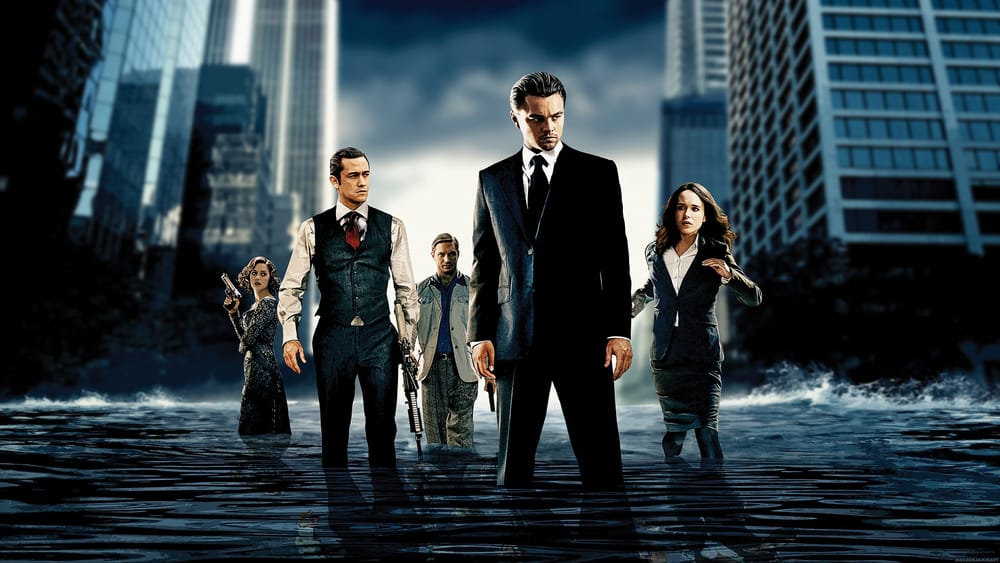Inception (2010)
“Inception” (2010), directed by Christopher Nolan, is a mind-bending science fiction thriller that explores the architecture of dreams, the nature of reality, and the power of the subconscious. Blending psychological depth with breathtaking visuals, it tells the story of a man haunted by his past and trapped between memory and illusion.
The film follows Dom Cobb (Leonardo DiCaprio), a highly skilled thief — not of money or secrets from safes, but of ideas from the human mind. Cobb is an extractor, an expert in a form of corporate espionage that takes place inside dreams. Using advanced technology, he and his team enter the subconscious of their targets to steal valuable information while they sleep.

Cobb’s rare talents have made him a fugitive, unable to return home to his children after being accused of murdering his wife, Mal (Marion Cotillard). He longs to go home, but his life has become a maze of guilt and grief — haunted by the memory of Mal, who appears in his dreams as a dangerous projection of his subconscious.

Cobb gets a chance at redemption when a powerful businessman, Saito (Ken Watanabe), offers him an impossible job — one that could clear his criminal record. Instead of extraction, Cobb must perform inception: planting an idea deep in someone’s mind so subtly that they believe it’s their own.

The target is Robert Fischer Jr. (Cillian Murphy), heir to a vast corporate empire. Saito wants Cobb to plant the idea that Fischer should dissolve his father’s company, preventing a global monopoly. To achieve this, Cobb assembles a team of specialists:
- Arthur (Joseph Gordon-Levitt), his meticulous partner.
- Ariadne (Elliot Page), a gifted architecture student who designs the dream worlds.
- Eames (Tom Hardy), a forger who can impersonate others within dreams.
- Yusuf (Dileep Rao), a chemist who creates powerful sedatives to stabilize deep dream layers.
Together, they plan a multi-layered dream — a “dream within a dream within a dream” — where time dilates exponentially with each level. The deeper they go, the more unstable and dangerous it becomes.
The operation unfolds in three dream levels:
- Level 1 – The City Chase: Yusuf drives a van through a rainy city as the team kidnaps Fischer. The environment is unstable due to his sedative mix.
- Level 2 – The Hotel: Arthur manipulates Fischer’s subconscious in a sleek hotel setting, convincing him that his mind is under attack and that the team are his protectors.
- Level 3 – The Snow Fortress: Eames leads the team through a snowy mountain fortress — a representation of Fischer’s inner defenses — where they must plant the idea in a symbolic “safe.”
Meanwhile, Cobb’s subconscious becomes the mission’s greatest threat. Mal’s projection keeps sabotaging their work, representing his unresolved guilt over her death. In flashbacks, we learn the truth: Cobb once performed inception on Mal — convincing her that their dream world wasn’t real. When they woke, she remained convinced that the real world was still a dream and killed herself, framing Cobb for her death.
As the dream levels collapse, the team faces mounting peril. Saito is fatally wounded, and Cobb must pursue him into Limbo — a deep, unconstructed dream space where time stretches endlessly and minds decay. There, Cobb confronts Mal one final time, accepting that she’s only a memory. He lets her go, freeing himself from his guilt.
Cobb finds Saito, now aged and disoriented, reminding him of their agreement. They shoot themselves to wake up — and Cobb opens his eyes on a plane. The mission is a success: Fischer believes the idea was his own, and Cobb’s record is cleared.
Finally returning home, Cobb reunites with his children. He spins his totem — a small spinning top — to test whether he’s still dreaming. The camera lingers on the top as it spins steadily… wobbles slightly… and then — cut to black.
The ending is deliberately ambiguous: is Cobb truly home, or still dreaming? Nolan leaves that mystery to the audience, symbolizing the film’s central theme — that sometimes, perception and belief matter more than objective reality.
With stunning visuals, a haunting score by Hans Zimmer, and a narrative that folds time and consciousness upon itself, Inception stands as one of the most intellectually ambitious and emotionally resonant films of the 21st century — a dream that refuses to fade.



